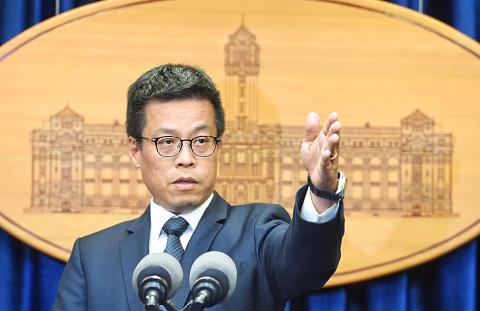Following new developments in a duty-free cigarette smuggling scandal, President Tsai Ing-wen (蔡英文) yesterday said that it is time to root out illicit practices that have long been a part of the nation’s bureaucracy, while the Presidential Office said that a preliminary investigation has produced no evidence of wrongdoing by mid to high-level officials.
Tsai said that she has entrusted the judiciary and new National Security Bureau (NSB) Director-General Chiu Kuo-cheng (邱國正) to investigate the case, and demanded that mismanagement and disciplinary problems found at China Airlines (中華航空), the Airport Police Bureau and national security agencies be corrected.
“We will respect the results of the investigation and all infractions found must be rectified,” Tsai said.

Photo: Liu Hsin-de, Taipei Times
“We have to face these illicit practices that have accumulated within the bureaucracy for many years,” she said. “Now that they have been exposed, they must be fixed.”
Presidential Office spokesman Alex Huang (黃重諺) told a media briefing that five trucks dispatched to transport items from Taiwan Taoyuan International Airport were controlled by NSB units.
“Two of the trucks were borrowed from the Presidential Office by the NSB’s presidential security units. They contained no illegal items, only luggage and transport equipment,” Huang said. “The large cache of cigarette cartons was transported on the three other trucks.”
A preliminary investigation found no involvement by mid to high-level officials at the Presidential Office or the National Security Council, he said, but added that “disciplinary measures are being assessed for the presidential security units implicated in the case.”
“An internal investigation has found that presidential security units under the NSB made large purchases of foreign duty-free goods to take advantage of the president’s overseas state visits,” Huang said.
The Taipei District Prosecutors’ Office, in coordination with the Ministry of Justice Investigation Bureau, yesterday searched five China Airlines offices, including those of its subsidiary, China Pacific Catering Services (華膳空廚), and its in-flight service supply division, corporate communications office, and cargo services and logistics division.
The raids began in the morning and ended at about 7pm, with investigators taking several cartons of materials.
Prosecutors also summoned for questioning NSB officers Wu Tsung-hsien (吳宗憲) and Chang Heng-chia (張恒嘉), who have been held with restricted communications.
On Thursday, prosecutors had searched their rooms at an NSB dormitory at the president’s residence.
Prosecutors yesterday also responded to a report by the China Times, saying that they did not enter the president’s official residence and that prior notice was given to Presidential Office staff.
Meanwhile, China Airlines handed out a first wave of punishments, demoting senior vice president Lo Ya-mei (羅雅美) to special assistant to the chairman and chartered flight division vice president Chiu Chang-hsin (邱彰信) to coordinator at the office of the airline’s president.
Lo and Chiu were responsible for arranging the chartered flights for Tsai’s visit to the nation’s four Caribbean allies, as well as previous trips in March and August last year to allies in the South Pacific and Latin America respectively.
The demotions are to take effect on Thursday next week, the airline said.
Additional reporting by Cheng Wei-chi

The CIA has a message for Chinese government officials worried about their place in Chinese President Xi Jinping’s (習近平) government: Come work with us. The agency released two Mandarin-language videos on social media on Thursday inviting disgruntled officials to contact the CIA. The recruitment videos posted on YouTube and X racked up more than 5 million views combined in their first day. The outreach comes as CIA Director John Ratcliffe has vowed to boost the agency’s use of intelligence from human sources and its focus on China, which has recently targeted US officials with its own espionage operations. The videos are “aimed at

STEADFAST FRIEND: The bills encourage increased Taiwan-US engagement and address China’s distortion of UN Resolution 2758 to isolate Taiwan internationally The Presidential Office yesterday thanked the US House of Representatives for unanimously passing two Taiwan-related bills highlighting its solid support for Taiwan’s democracy and global participation, and for deepening bilateral relations. One of the bills, the Taiwan Assurance Implementation Act, requires the US Department of State to periodically review its guidelines for engagement with Taiwan, and report to the US Congress on the guidelines and plans to lift self-imposed limitations on US-Taiwan engagement. The other bill is the Taiwan International Solidarity Act, which clarifies that UN Resolution 2758 does not address the issue of the representation of Taiwan or its people in

US Indo-Pacific Commander Admiral Samuel Paparo on Friday expressed concern over the rate at which China is diversifying its military exercises, the Financial Times (FT) reported on Saturday. “The rates of change on the depth and breadth of their exercises is the one non-linear effect that I’ve seen in the last year that wakes me up at night or keeps me up at night,” Paparo was quoted by FT as saying while attending the annual Sedona Forum at the McCain Institute in Arizona. Paparo also expressed concern over the speed with which China was expanding its military. While the US

SHIFT: Taiwan’s better-than-expected first-quarter GDP and signs of weakness in the US have driven global capital back to emerging markets, the central bank head said The central bank yesterday blamed market speculation for the steep rise in the local currency, and urged exporters and financial institutions to stay calm and stop panic sell-offs to avoid hurting their own profitability. The nation’s top monetary policymaker said that it would step in, if necessary, to maintain order and stability in the foreign exchange market. The remarks came as the NT dollar yesterday closed up NT$0.919 to NT$30.145 against the US dollar in Taipei trading, after rising as high as NT$29.59 in intraday trading. The local currency has surged 5.85 percent against the greenback over the past two sessions, central